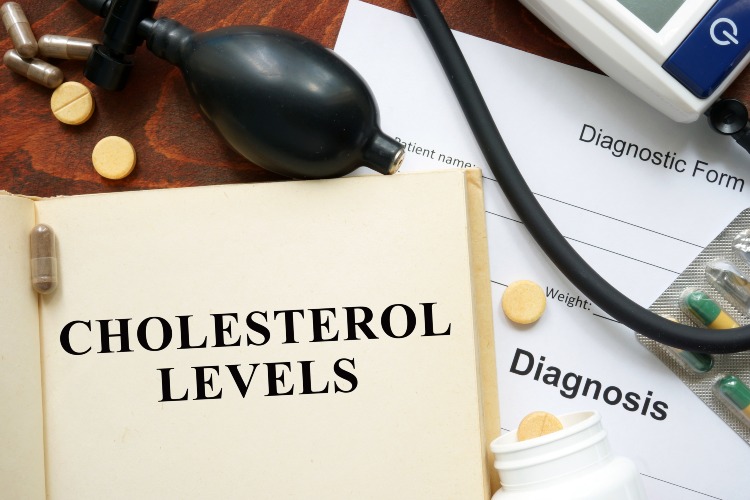High Cholesterol Treatment in Sugar Land, TX
Concerned about high cholesterol symptoms? Seeking professional guidance is paramount to mitigating the risks associated with elevated cholesterol levels. At Complete Cardiology Care in Sugar Land, TX, we emphasize the importance of proactive management and treatment of high cholesterol. Unchecked high cholesterol can lead to serious cardiovascular complications, including heart disease and stroke. Don’t delay – schedule a consultation with us today to take control of your cholesterol levels and safeguard your heart’s well-being.
CONTACT US

What Is High Cholesterol?
High cholesterol refers to elevated levels of cholesterol in the blood, specifically low-density lipoprotein (LDL) cholesterol, often referred to as “bad” cholesterol. Cholesterol is a waxy substance produced by the liver and obtained from certain foods. While cholesterol is necessary for various bodily functions, including cell membrane structure and hormone production, excessive levels can accumulate in the arteries, leading to atherosclerosis or the buildup of plaque. Over time, this plaque can narrow the arteries and restrict blood flow, increasing the risk of heart disease, heart attack, and stroke.
What Causes High Cholesterol?
Certain lifestyle habits and dietary choices can contribute to high cholesterol levels, increasing the risk of heart disease and related complications. According to our expert team, some common factors that can cause high cholesterol include:
- Unhealthy Diet – Consuming foods especially high in saturated and trans fats can elevate LDL cholesterol levels in the bloodstream.
- Lack of Physical Activity – Sedentary lifestyles and insufficient exercise can lower levels of high-density lipoprotein (HDL) cholesterol, the “good” cholesterol that helps remove LDL cholesterol from the blood.
- Smoking – Tobacco smoke contains chemicals that can damage blood vessel walls, promoting the accumulation of cholesterol and the formation of plaque, ultimately narrowing the arteries and impairing blood flow.
Symptoms of High Cholesterol
Recognizing the symptoms of high cholesterol is crucial for early detection and management of this condition. The most common symptoms associated with high cholesterol include:
- Xanthomas – These are fatty deposits that appear as yellowish bumps or patches on the skin, particularly around the eyes, elbows, knees, or hands, and can indicate elevated cholesterol levels.
- Chest Pain or Angina – High cholesterol can lead to the buildup of plaque in the coronary arteries, restricting blood flow to the heart and causing chest pain or discomfort, especially during physical activity or exertion.
- Peripheral Artery Disease (PAD) – Restricted blood flow to the legs and feet as a result of narrowed arteries can result in symptoms including leg pain, cramping, weakness, or numbness, particularly during walking or exercise.
Health Risks Associated With High Cholesterol
High cholesterol levels can significantly increase the risk of various cardiovascular complications and other health problems. Here are three significant health risks associated with high cholesterol:
- Heart Disease – Elevated cholesterol levels contribute to the buildup of plaque in the arteries, increasing the risk of coronary artery disease, heart attacks, and other cardiovascular issues.
- Stroke – Narrowed or blocked arteries due to plaque buildup can impede blood flow to the brain, thereby increasing the likelihood of a stroke, which can result in permanent neurological damage or even death.
- Peripheral Artery Disease (PAD) – Restricted blood flow to the extremities can lead to PAD, characterized by leg pain, numbness, and poor wound healing, potentially resulting in tissue damage or amputation.
High Cholesterol Prevention Methods
Preventing high cholesterol involves adopting a healthy lifestyle and, in some cases, medication. Lifestyle modifications such as maintaining a balanced diet low in cholesterol and saturated fats, exercising regularly, maintaining a healthy weight, and avoiding smoking can help prevent high cholesterol. Additionally, healthcare providers may prescribe cholesterol-lowering medications such as statins or other lipid-lowering drugs for individuals at high risk or with persistently elevated cholesterol levels despite lifestyle changes.
Contact Complete Cardiology Care
Managing high cholesterol is essential for maintaining a healthy heart and reducing the risk of cardiovascular diseases. At Complete Cardiology Care in Sugar Land, TX, our dedicated team is committed to providing comprehensive treatment options tailored to each patient’s needs. With our expertise and personalized approach, we can help you effectively manage your cholesterol levels and improve your overall heart health. Don’t let high cholesterol hold you back – take the first step towards a healthier heart by scheduling an appointment today. To learn more about what our patients think of our cardiology services, check out our patient testimonials
